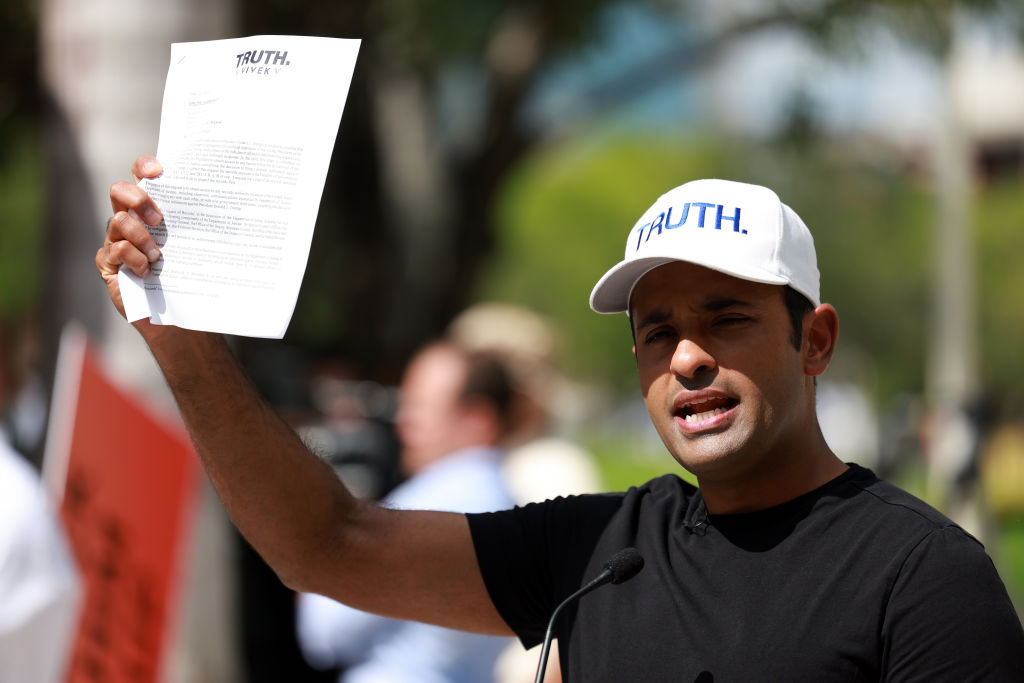Happy Monday! A warm welcome to Thomas Dorsey, the Dispatch summer intern who—after an intense series of trial-by-fire tasks designed to assess his wits, pain tolerance, and daring—has been assigned to our Dispatch Politics newsletter for the summer.
Up to Speed
- The Washington Post reported last week that former President Donald Trump rejected proposals from his lawyers late last year to cooperate more fully with the Justice Department in the hope of preventing the matter from intensifying to the point of last week’s indictment. Instead, Trump relied on strategic advice from Tom Fitton, the activist who runs the conservative group Judicial Watch, who argued Trump had a legal right to keep the documents the Justice Department wanted.
- In a Wall Street Journal op-ed last week, Judicial Watch attorney Michael Bekesha laid out Fitton’s argument: “The Presidential Records Act allows the president to decide what records to return and what records to keep at the end of his presidency.” As evidence, Bekesha pointed back to a case he and Judicial Watch lost in 2012, when they sued the government to attempt to recover presidential records from former President Bill Clinton—audiotapes made during meetings with between Clinton and a historian that included recordings of official White House business—that they argued Clinton had improperly designated as personal. Judge Amy Berman Jackson ruled that it was the president’s prerogative to choose what subset of official presidential records he was designating as personal.
- Trump, who dined with Fitton the night before his Miami arraignment last week, repeatedly shared Bekesha’s op-ed on social media over the weekend. “Indictment must be immediately withdrawn by the Injustice Department, with apology!” he wrote.
- But other legal experts say the argument is grievously flawed and unlikely to hold up in court. Former federal prosecutor Andrew McCarthy wrote at National Review last week that Judicial Watch’s argument is based on a simple but categorical misreading of the Presidential Records Act. The classified documents over which Trump has been indicted, he wrote, are agency records—records produced by the government’s intelligence agencies, to which the president has access but which he does not own. And the Presidential Records Act is explicit that agency records are not presidential records.
- Daniel Ellsberg, the whistleblower whose leaking of the Pentagon Papers revealed government dishonesty about the Vietnam War and launched the chain of events that led to the Watergate scandal and the resignation of President Richard Nixon, died this weekend at the age of 92.
Vivek Ramaswamy’s Indictment Bank Shot
Most of Donald Trump’s Republican challengers are running a playbook you could call Trump minus—all the good things Republican voters like about Trump’s first term, minus the outbursts and sideshows and chaos. Biotech entrepreneur Vivek Ramaswamy, on the other hand, is running as Trump plus, regularly promising on the campaign trail to take the America First agenda “miles further than Donald Trump did.”
This posture gives Ramaswamy a certain degree of freedom to maneuver. While other Republicans tiptoed around the politics of Trump’s indictment last week, Ramaswamy threw himself into the story—as Trump’s biggest defender. He made swaggering appearances on cable news to proclaim the whole thing was likely a setup ordered by Joe Biden: “With due respect, I think it is shameful that I as a competitor to President Trump in this race have to ask questions that the media isn’t asking.” And he schlepped down to Miami ahead of Trump’s arraignment Tuesday to proclaim to the media and Trump supporters that he was challenging the rest of the field to join him in pledging to pardon Trump.
“Each of our paths to electoral success would be easier if President Trump were eliminated from competition, but that is the wrong result for our country,” Ramaswamy told the crowd, brandishing a copy of his pardon pledge. “The fact that we are running against Trump gives us credibility to denounce this politicized prosecution.”
Ramaswamy made repeated variations on this theme over the last week, each time making sure to point out that the good political move would be to kick Trump while he’s down—but that he, perhaps uniquely among his rivals, was willing to put his principles above his own political fortunes. Of course, saying you’re putting your principles over politics is a time-honored political move. There’s even a bank-shot political argument against Trump himself here, since Ramaswamy regularly tells voters on the trail that the reason he’s well-positioned to take Trump’s agenda to the next level is “because I’m grounded in principles. I’m grounded in a moral foundation. This is not about personal vengeance or grievance for me.”
But a promise to put principles over politics is only as good as the principles themselves. In making his Trump defense, Ramaswamy has echoed Judicial Watch’s argument that the Presidential Records Act as interpreted by the courts gives the president broad latitude to designate any government records he wishes as personal.
“The Presidential Records Act is the most relevant statute to the alleged crime at issue,” Ramaswamy spokeswoman Tricia McLaughlin tells The Dispatch, “much more so than the vague and overbroad Woodrow Wilson era law (Espionage Act) that’s been abused countless times over the last century to wrongfully punish disfavored political dissenters.”
But as we noted at the top of the newsletter, the plain text of the Presidential Records Act makes clear that it does not concern the presidential handling of agency records like the highly classified ones Trump is accused of improperly retaining. Rather, the act governs the handling and archiving of records the president and his office themselves generate during the execution of their duties. The act also governs which of those records he can designate as personal on the grounds that they are “of a purely private or nonpublic character which do not relate to or have an effect upon” the carrying out of his duties as president. Even assuming that the president can take any presidential record he wishes and deem it a personal record, this has no bearing on the crimes of which Trump is actually accused, which involve improperly retaining classified agency materials to which he had access while president of the United States.
Can Josh McKoon Make Georgia Republicans Play Nice?
COLUMBUS, Georgia—In recent years, Georgia’s Republican Party has been racked by disagreement on how closely to ally itself with Donald Trump. With three consecutive U.S. Senate defeats and Trump’s 2020 loss in Georgia, the state party has been shaken by underperformances in the newly purple state.
Earlier this month, more than 2,000 GOP delegates gathered here for their state party convention to try to chart a new path. One week into the job, newly elected state party chairman Josh McKoon is vowing to unite state Republicans and deliver Georgia for the Republican presidential nominee in 2024—“whoever that winds up being.”
McKoon, who pledges not to put his thumb on the scale in primaries moving forward, is taking the helm at a time when intraparty divisions run deep.
Looking to make examples of the Republicans who had not supported his question to overturn Joe Biden’s victory, Trump recruited MAGA primary challengers last year against Gov. Brian Kemp and Secretary of State Brad Raffensperger. Then-state party chair David Shafer, while remaining officially neutral, effectively aligned himself and the party with Trump’s challengers. But Kemp and Raffensperger won their primaries overwhelmingly, and both went on to reelection in November. The state GOP found it had burned bridges with two of the state’s top elected Republicans.
McKoon says he is well positioned to repair these interpersonal ruptures and reorient the GOP to its core mission: beating Democrats at the ballot box.
During a wide-ranging interview, McKoon says he enjoys “a very good relationship” with Kemp that dates back to the governor’s run for agriculture commissioner 17 years ago. The new chair also insists Kemp doesn’t get enough credit for passing Georgia’s fetal heartbeat bill and keeping businesses open during the pandemic.
“I’m excited to be working with him and our entire Republican team to fire Joe Biden in November of 2024,” McKoon tells The Dispatch. “That’s where my focus will be and will remain. Everything else to me is just noise.”
McKoon says he plans to invest heavily in absentee and early voting infrastructure so that Republicans can better compete with Democrats’ well-oiled turnout machine come Election Day. That’s not uncontroversial in the state party, where many base voters remain deeply loyal to Trump and his false narratives of a stolen 2020 election. “I’d love to see paper ballots brought back,” 65-year-old delegate Patti Minton of Gainesville tells The Dispatch. “Machines don’t work.”
As chair, McKoon will continue to extend at least one olive branch to 2020’s election deniers: He says the state party will continue to underwrite the legal defense of the so-called “alternate electors”—David Shafer among them—who gathered at the state capitol in December 2020 to sign a document “certifying” Georgia’s election victory for Trump. A Fulton County prosecutor is investigating whether this constituted illegal election-meddling under state law.
“These are volunteers who signed up to be presidential electors,” McKoon said. “They were given specific legal advice that casting these electoral votes was to preserve the president’s right if his election contest was successful, which was still pending on December 14, 2020 … Who’s ever going to sign up to be a presidential elector again, if the Georgia Republican Party abandons them in the wake of this partisan prosecution?”
What Kemp will make of McKoon’s olive branch remains to be seen. After raising vast sums of money into his state and federal political action committees last year, the governor seems to have gotten used to working on his own. As we reported last month, Kemp’s federal super PAC, Hardworking Americans, Inc., plans to spend heavily on grassroots organizing and paid advertising on behalf of the GOP presidential nominee. Kemp will also co-host a Republican presidential cattle call in Atlanta in August alongside Georgia-based radio host Erick Erickson.
Former Vice President Mike Pence, Florida Gov. Ron DeSantis, South Carolina Sen. Tim Scott, former U.N. Ambassador Nikki Haley, former New Jersey Gov. Chris Christie, and tech entrepreneur Vivek Ramaswamy are all currently planning to attend. Trump didn’t make the invite list.
Eyes on the Trail
- Trumpmentum: Donald Trump is claiming to have opened a big lead in Iowa over Ron DeSantis, citing an internal campaign poll that showed him topping the Florida governor 51 percent to 19 percent. Sen. Tim Scott of South Carolina was a distant third, with 9 percent, followed by former Vice President Mike Pence at 6 percent. The survey, from pollster John McLaughlin, was conducted June 10–12, after Trump was indicted on federal charges of mishandling classified documents. And the poll found that 96 percent of respondents were aware of the former president’s latest legal troubles. “Trump is in command and still has room to grow,” McLaughlin writes in the Trump campaign memorandum. The poll surveyed 500 likely participants in the 2024 Iowa caucuses; it had an error margin of 4.4 percentage points.
- Bismarkie. North Dakota Gov. Doug Burgum is a distant presidential contender, but he’s hired a bevy of experienced Republican operatives to staff his longshot campaign. Fred Davis is the media consultant; Chip Englander is the pollster; Chris and Mike Schrimpf are handling communications; Lance Trover is the press secretary; and Burgum’s Iowa state director is Eric Woolson, who managed former Arkansas Gov. Mike Huckabee’s upset victory in the Iowa caucuses in 2008 and previously advised President George W. Bush and former Iowa Gov. Terry Branstad. The campaign manager is Mike Zolnierowicz and the deputy campaign manager is Dawson Schefter.
Notable and Quotable
“I don’t know why some of my competitors in the Republican primary presume the president will be found guilty.”
—former Vice President Mike Pence on why he isn’t saying if he’d pardon Donald Trump to NBC’s Meet the Press, Sunday, June 18
Correction, June 19, 2023: An earlier version of this newsletter stated that Judicial Watch’s Tom Fitton was an attorney. He is not.








Please note that we at The Dispatch hold ourselves, our work, and our commenters to a higher standard than other places on the internet. We welcome comments that foster genuine debate or discussion—including comments critical of us or our work—but responses that include ad hominem attacks on fellow Dispatch members or are intended to stoke fear and anger may be moderated.
With your membership, you only have the ability to comment on The Morning Dispatch articles. Consider upgrading to join the conversation everywhere.